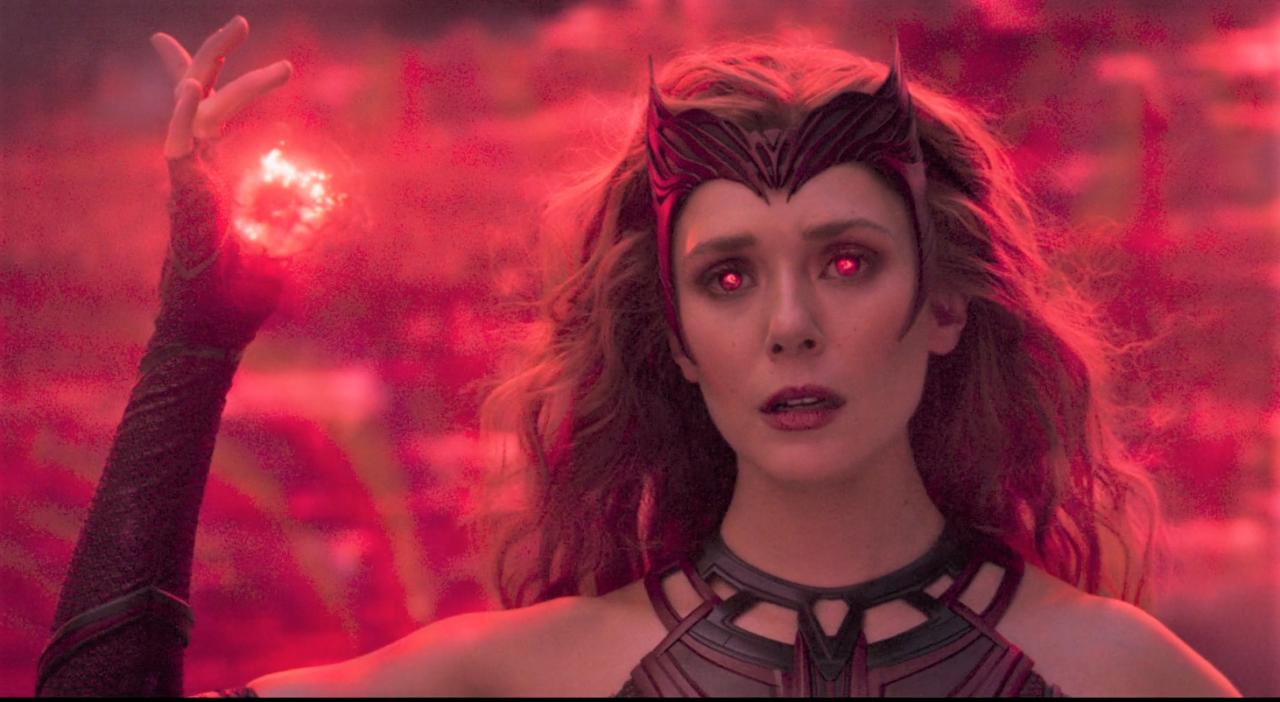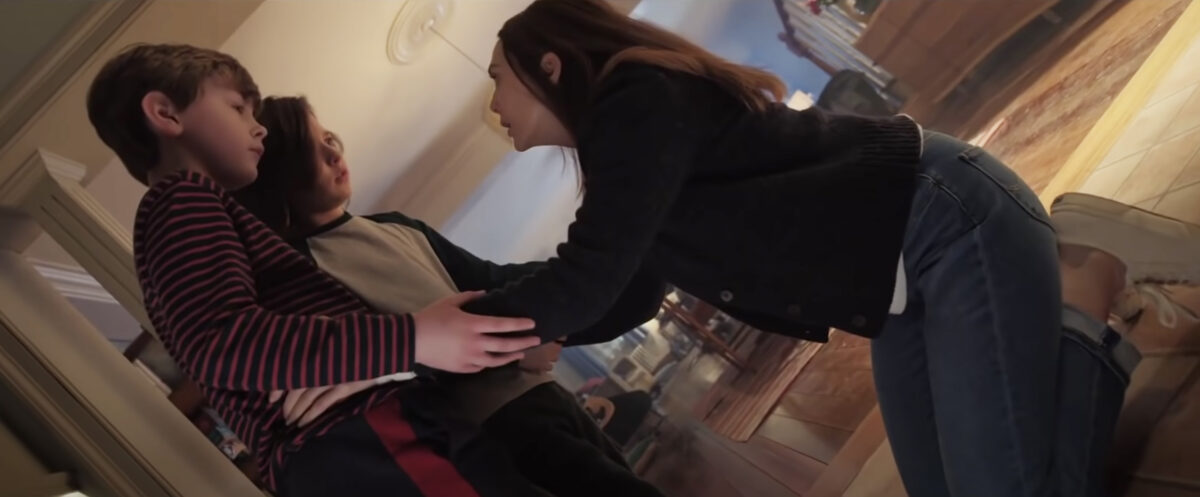I saw Doctor Strange in the Multiverse of Madness on opening night with a lesbian friend of mine whose crush of the month has been Wanda Maximoff. I left the theater with a lightly bruised wrist because every time Wanda showed up onscreen, my friend squeezed my hand. Tighter and tighter, the longer Wanda remained onscreen. We gasped and cheered and watched for Wanda. That’s what she means to us. (Spoilers ahead!)
Multiverse of Madness has sent earth-shattering tremors of division throughout the Marvel fandom. We’ve all felt it. Whoever you ask has a different opinion on the film. The most divisive character in the movie is Wanda Maximoff, aka the Scarlet Witch. She is undoubtedly the star of the show. This movie, for many of us, is WandaVision 2.0. And I love that for us. I love that for Marvel. Because Marvel’s historically been lacking when it comes to their female characters. Most of them have been reduced to love interests, damsels in distress, sidekicks, supporting players to their male counterparts. Scarlet Johansson’s Black Widow was the first female Avenger in the movies but was often reduced to a femme fatale, a sex symbol, a boy mom. She was written to strike ridiculous poses in a tight-fitting jumpsuit with a plunging neckline to satisfy the male gaze. Wanda, however, caters to the female gaze.
I left Multiverse of Madness feeling like I was crashing down from a high because of Wanda’s apparent demise. I couldn’t put my finger on why I felt so happy every time Wanda was onscreen. But after these past couple of weeks, after watching the discourse on Twitter and TikTok and in news articles over Wanda, I’m feeling defensive. Fans and critics, many of them men, have been arguing over Wanda’s morality. Is she good or evil? I’ve seen viewers attribute labels to her like “monstrous” and “crazy.” They’re upset she’s so overpowered. They’re upset she was able to kill the “smartest man in the world” with a flick of her finger. They’re upset she destroyed the Illuminati with little effort. They’re upset she seemed to change so much from WandaVision. They’re upset she’s “unlikeable.” They’re upset she’s a villain.
I love Wanda for all of these things. And many online agree with me. We know what Wanda did was wrong. We know she murdered innocent people on a destructive quest to find her possibly fake children. We know she’s a “villain.” And we love her because of this. Wanda is a woman with agency. She is not out of control as many claim—she is entirely in control of her actions. She only uses the Darkhold as a tool to help her achieve her personal goals. She has no male counterpart to support and no male audience to assuage since she is positioned as an antagonist. She can do whatever the hell she wants. This is Wanda in her full glory, no holding back. And it’s beautiful.

Wanda appeals to the female gaze. The female gaze is defined in opposition to the male gaze, which tends to focus on pleasing a male viewer by focusing on a person’s physical body rather than their personality and emotions. Unlike a traditional femme fatale, Wanda is covered up. She’s never objectified. Her beautifully designed costume covers her arms and legs while providing some form of armor for her torso. This is in contrast with the ridiculous outfit Joss Whedon stuck the character in at the end of Age of Ultron, which glammed her up without functionality with a push-up bustier. In MoM, Wanda doesn’t need to bare skin as the male gaze calls for in order to be considered hot.
The female gaze also tends to focus on hands and eyes when it comes to intimacy. Wanda’s powers manifest in her glowing red eyes and intricate hand movements. Her hands, particularly, act as windows into her emotions and personal development. In earlier movies, her hand movements are more graceful and elegant when using her magic. They are still that way in this movie, but her hands begin to move more sporadically. Her fingers turn deep black and move more fiercely, depicting her changing temperament.
The female gaze emphasizes the range of emotions women feel and the various ways of expressing them. Wanda displays grief, pride, love, rage, and more. At the end of WandaVision, she has lost everything she worked so hard to maintain, and she has access to a corruptive book that allows her to get what she wants back. While more screentime could have been used to show how she becomes more “villainous,” Wanda’s character development from WandaVision to MoM isn’t an implausible jump at all. Wanda has never been a perfect hero—she’s always been doing the best she can to survive. From Hydra to the Avengers, Wanda has always been driven by self-preservation and her fierce love for her family, which continues into MoM. She represents the grief and rage of a mother who has lost her children. As mothers online have been commenting, they understand Wanda’s feelings and relate to her pain. Her rage is not “crazy” as many have derogatorily dubbed it—it’s a mother’s understandable reaction to losing her children. The way viewers are quick to call Wanda a madwoman is indicative of the widespread gaslighting that dismisses emotional women as hysterical instead of validating their experiences.

What’s more, Wanda’s children symbolize the normal, happy life that was stolen from her that she tried to achieve in WandaVision. She’s trying to get that life back for herself, an extremely relatable struggle particularly for the queer community (see more in this Washington Post article.) Wanda has lost her parents, her brother, her country, her husband, and her children. Her wish for her children is no reduction to her character. She is just trying to find some semblance of happiness and stability again. (I do have one gripe about this, though: why isn’t Vision included in her quest for a perfect life? She originally made the hex to revive him. He was her partner and one of the few people unafraid of her power. I wish the writing had at least justified why she wasn’t looking for him, too.)
Wanda is also a woman in a mental health crisis. She is a woman trapped in the grief of losing her family all over again with no one to help her through it. When Doctor Strange shows up at the beginning of MoM to talk to Wanda, we find out he knew about WestView, and yet he did nothing. He knew where Wanda has been this whole time and has not once cared to check in on her. He only comes by when he needs something from her, an experience many women might relate to when it comes to both platonic and romantic relationships with men.
Witnessing Wanda’s brutal rage is cathartic to witness as a woman. She does not adhere to any kind of respectability politics. She has given up hiding her anger behind a smile, a quiet and polite voice, etc. She emphasizes in the beginning of the movie that she is being “reasonable,” and tries to do her best to hurt as few people as possible in her quest for her children. But then people start getting in her way, and she does what she needs to do to get her children back. Witnessing her burn down Kamar-Taj felt delicious. Watching a woman—an angry, powerful woman with no one limiting her—kill all these people to achieve her goal felt empowering. I know that sounds wrong, but it’s true. This is what Wanda is for many of us—female empowerment. I know what she did was “villainous,” but she’s a fictional character. I’m tired of people labeling her solely as a “villain”—it ignores everything else that Wanda is. She doesn’t need perfect morality for me to like her, to identify with her, to support her. She is a woman with practically unlimited agency—a rare type of character to see in film, especially in the superhero genre. As Lady Gaga once said, “I don’t believe in the glorification of murder. I do believe in the empowerment of women.”
All that said, this cannot be the end of Wanda’s story. It would be a massive waste of her character and Elizabeth Olsen’s talent. Wanda may have realized she can’t take her children from a variant in another multiverse, but that doesn’t mean she’s not going to stop searching for her happiness. I hope she finds it. And I hope we’re all there to watch when she finally does.
Doctor Strange in the Multiverse of Madness is in theaters now.

Comments